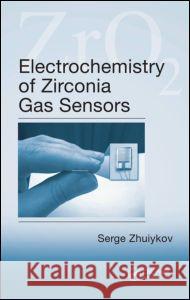Electrochemistry of Zirconia Gas Sensors » książka
Electrochemistry of Zirconia Gas Sensors
ISBN-13: 9781420047615 / Angielski / Twarda / 2007 / 320 str.
The first book to present a detailed analysis of the electrochemistry, development, modeling, optimization, testing, and technology behind modern zirconia-based sensors, Electrochemistry of Zirconia Gas Sensors explores how to tailor these sensors to meet specific industrial needs. The book addresses a range of different stages of development in zirconia-based sensors for gaseous and molten metal environments, focusing on an accessible form from analysis of interaction at the measuring environment-zirconia sensor interface to reliability testing of the sensors.
The coverage highlights different fundamental aspects of electrochemistry and physical chemistry of zirconia, mathematical modeling, optimization parameters, and structures of the electrode materials. The author highlights the factors that determine high sensitivity, critically reviews the limitations of current technologies, and surveys the needs and possibilities of future developments. He covers technologies for vacuum-tight joining zirconia to ceramic insulators and sensor construction materials as well as sensor design and concepts of the total-NOx sensor based on mixed potential. The book includes a critical overview of existing technologies of zirconia gas sensors including nanotechnology.
This book fills the gap between pure academic research of the zirconia-based gas sensors, explaining the influence of the double electrical layer on the sensor output signal and the applied, technological, down-to-earth approaches adopted by the vast majority of the industrial companies working in this field. Providing guidance on how to organize a testing program of gas sensors, the book allows readers to look forward in evaluating future trends in the zirconia gas sensors development.











